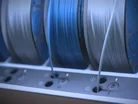KLM is recycling plastic bottles to make 3D printed tools

KLM Royal Dutch Airlines is the first airline in the world to recycle PET bottles to make tools for repairing and maintaining its aircraft.
Empty bottles are collected at the end of every flight and transformed into filament, the material used in 3D printers. This process means an empty water bottle can end up as part of a 3D-printed piece of equipment that saves KLM’s Engineering & Maintenance department time and money.
In the same way normal printers use ink, 3D printers need filament to print with. KLM used to buy this material from external suppliers. But now empty PET bottles from its flights are delivered to a recycling company in exchange for high-quality plastic pellets, which are the main material in filament. The tonnes of plastic bottles that are taken off aircraft at Amsterdam Airport Schiphol every year are recycled into this filament.
“We are continuously investing in sustainable and innovative products and processes,” commented Ton Dortmans, Executive Vice President Engineering & Maintenance. “For our customers, for society and for our own employees. It's terrific to see how we are able to make useful products from waste materials.”
SEE ALSO:
US Air Force combines with SIMBA Chain in 3D printing drive
Oerlikon opens $55mn additive manufacturing facility
AFI KLM Engineering & Maintenance signs Boeing engine contract with Kuwait Airways
Read the latest issue of Manufacturing Global here
KLM Engineering & Maintenance has been using 3D printers for quite some time in ways that speed up repair and maintenance processes. For example, special plugs have been developed to ensure that rim holes don't get painted over when the wheels on Boeing 737s are painted.
Protective tape is no longer used at Engine Services during the maintenance of turbine blades. It has been replaced by a 3D-printed cover. And the tool Engine Services designed for removing overhead baggage bins on board the Boeing 787 means this task can now be carried out by one mechanic instead of two.
KLM heeft als doel om in 2030 het restafval met 50 procent te verminderen ten opzichte van 2011, door in totaal minder afval te produceren en het deel dat gerecycled kan worden te verhogen. In 2018 is het restafval verminderd met 9 procent en werd 28 procent gerecycled.
E&M currently uses around 1.5 kg of high quality filament every day. Because KLM now supplies PET bottles as a raw material, the cost of this filament has dropped from EUR 60/kg to just EUR 17/kg. By working with the recycling company Morssinkhof Rymoplast and the filament manufacturer Reflow, KLM is now able not only to be innovative in its use of 3D printing, but also to make the process circular.
KLM aims to reduce the volume of its waste by 50% in 2030, compared to 2011 levels. This will be achieved by producing less waste overall and increasing the amount that can be recycled. In 2018, KLM reduced waste by 9% and 28% of what remained was recycled.

